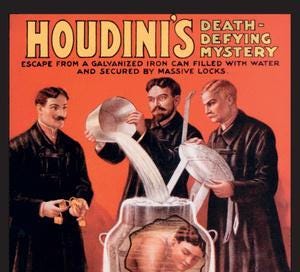Harry Houdini1 ( 1874-1926), master magician and escape artist, wrote in A Magician Among the Sprits, (1924) that he had "accumulated one of the largest libraries in the world on psychic phenomena, Spiritualism, magic, witchcraft, demonology, evil spirits, etc., some of the material going back as far as 1489.
The development of Houdini’s book collection has been presented in the Book Collector which describes his interaction with other collectors.2 He also collected books on theatre—estimated worth $500,000 in 1920.
Library of Congress Holds Houdini’s Magic Book Collection
In 1927, through Houdini's bequest, the Library of Congress received 3,988 volumes from his collection. While strongest in nineteenth and twentieth century publications on spiritualism- Houdini doubted "if any one in the world has so complete a library on modern Spiritualism: - the Houdini Collection contains a number of magic books inscribed or annotated by well-known magicians.3
In an essay, "Things Magical in the Collections of the Rare Book Division," 4 this collection is analyzed and contains prints, playbills, printed ephemera, periodicals, and many volumes of pamphlets on such topics as card tricks, mediums, hypnotism, handcuff escape methods, and chalk-talking.
Houdini’s Theatrical Collection is in Texas
Houdini's theatrical collection —theater programs, playbills posters, and memorabilia— was sold after his death and donated to the University of Texas Theater Library. His papers are there as well.5
Despite claiming he was born in Appleton, Wisconsin, the magician, escape artist, business man, aviator, author, and actor popularly known as Harry Houdini was born Erik Weisz in Budapest, Hungary, to Rabbi Mayer Weisz and Cecilia Steiner on March 24, 1874. As was often the case for immigrants, the spelling of the family name was changed to Weiss and Erik became Ehrich (whose nickname Ehrie, became Harry). In 1876, Rabbi Weisz immigrated ahead of his family to the United States and eventually secured a position at a synagogue in Appleton, Wisconsin, in 1878. Later that same year, Cecilia Weisz, along with their four sons Erik, Herman, Nathan, and William, joined Rabbi Weisz in Wisconsin.
Downs, Troy, “Harry Houdini’s Library, The Book Collector 69 (Summer, 2020); 251-265.
Harry Houdini Collection: Publications, scrapbooks, and other material relating to spiritualism and magic. Library of Congress.
Leonard N. Beck. "Things Magical in the Collections of the Rare Book Division," Quarterly Journal of the Library of Congress. 31 October 1974: p. 208-234.
Harry Houdini: An Inventory of His Papers at the Harry Ransom Center. The Harry Houdini Collection is comprised of papers, documents, correspondence, and artifacts associated with the magician, escape artist, businessman, aviator, author, and actor popularly known as Harry Houdini.





Thanks! I'd forgotten he gave his magic collection to LC. The article by Leonard Beck is an excellent summary. The best biography to read is William Kalush and Larry Sloman, "The Secret Life of Houdini: The Making of America's First Superhero" (Atria Books, 2006). I also have a rare little booklet about the hoax cooked up by Bess Houdini and medium Arthur Ford to keep Houdini's name alive by claiming that Ford delivered a message, agreed upon by Harry and Bess while he was still alive, so that she would know there was a life after death. Ralph G. Pressing, "Houdini Unmasked: Code Message Received" (Daily News, Lily Dale, NY, 1947).
I looked up HH's Wikipedia entry. Very strange and tragic how he died. He was much more of a Renaissance man than I ever knew.